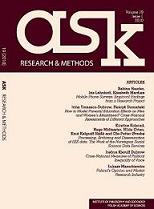What do respondents and non-respondents think of incentives and how do they react to them? The ESS experience in Poland
What do respondents and non-respondents think of incentives and how do they react to them? The ESS experience in Poland
Author(s): Dariusz Przybysz, Paweł B. Sztabiński, Franciszek SztabińskiSubject(s): Social Sciences
Published by: Instytut Filozofii i Socjologii Polskiej Akademii Nauk
Keywords: incentives in surveys; response rate; European Social Survey
Summary/Abstract: One method to increase the response rate in surveys is to use respondent incentives. The effectiveness of incentives depends on a number of factors which, however, may have a varied impact on respondents’ decisions about survey participation across countries. This paper shows how respondent incentives have worked in Poland, i.e. how monetary and material incentives are viewed, whether or not it is reasonable to send prepaid incentives by mail and how incentives affect the structure of the effective sample. Results of in depth interviews and comments on to incentives used in the European Social Survey have shown that the respondents who are willing to accept a small material incentive do not accept a modest monetary incentive. In the case of monetary incentives, expectations are very high and, in most surveys, unrealistic. Research results also suggest that some respondents are distrustful about prepaid incentives received by mail. They associate such incentives with direct marketing practices, attempted fraud or scams. From this perspective, it seems safer to opt for incentives being handed over personally by interviewers. However, the use of incentives does not significantly affect the structure of the effective sample.
Journal: ASK. Research & Methods
- Issue Year: 2012
- Issue No: 21
- Page Range: 87-122
- Page Count: 36
- Language: English

